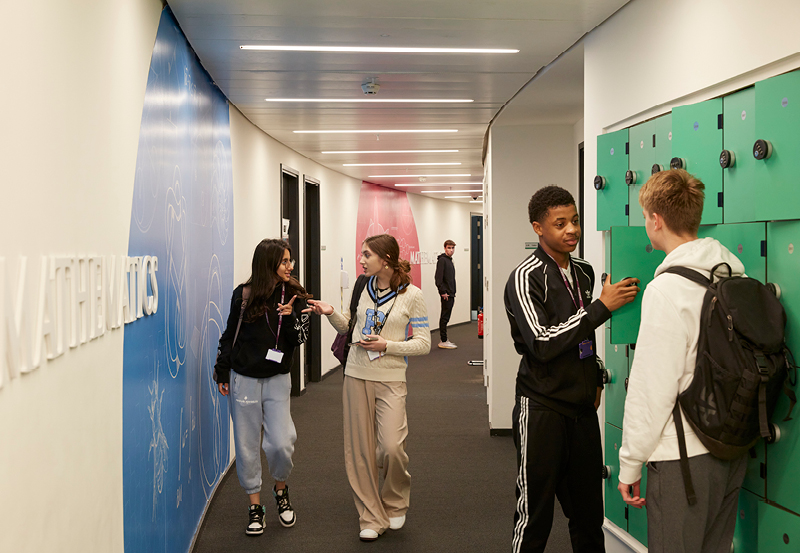Comparing the South African and UK Education Systems: A Guide for South African Students Looking to Study in the UK.
19th February 25

Introduction: Understanding the Differences
Thinking about pursuing your education in the UK as a South African student? Whether you are considering GCSEs, A-Levels, or an International Foundation Programme (IFP), it is important to understand how the South African and British education systems compare.
Both countries offer structured educational frameworks, but they differ in several key aspects, including curriculum design, assessment processes, university admission criteria, and vocational training opportunities. Gaining insight into these distinctions can help you make an informed decision about your academic journey.
This guide will compare General Education and Training (GET), Further Education and Training (FET), and university entry in South Africa with the UK’s GCSEs, A-Levels, and university admission pathways. We will also explore why Abbey DLD Colleges (Cambridge, Manchester, and DLD College London) are an excellent choice for South African students looking to study in the UK.

Structure of the Education Systems: South Africa vs UK
Primary Education: General Education and Training (GET) vs British Primary Education
| Aspect | South Africa: GET (Grades R-9) | UK: Primary & Lower Secondary |
| Age Range | 5-15 years old | 5-14 years old |
| Duration | 10 years | 9 years |
| Key Stages | Foundation Phase (Grades R-3), Intermediate Phase (Grades 4-6), Senior Phase (Grades 7-9) | Primary School (Years 1-6), Lower Secondary (Years 7-9) |
| Core Subjects | Home Language, Additional Language, Mathematics, Natural Science, Social Science, Life Orientation, Technology | English, Mathematics, Science, History, Geography, Languages |
| Assessments | End-of-year school-based assessments | Regular testing, SATs (Standard Assessment Tests) in primary years |
Key Differences:
The UK follows a structured, assessment-based system, whereas South Africa has continuous assessment methods and allows for more subject integration across phases.
South African students receive education in their home language up to Grade 3, after which English or Afrikaans becomes the primary language of instruction. In contrast, the UK provides instruction primarily in English from the start, with an emphasis on language proficiency from early years.

Secondary Education and Beyond: A Comparative Table
| Aspect | South Africa: Further Education and Training (FET) | UK: GCSEs, A-Levels & University |
| Age Range | 15-18 years old (Grades 10-12) | 14-16 years old (GCSE), 16-18 years old (A-Levels) |
| Duration | 3 years (Senior Secondary) + 3-6 years (university) | 2 years (GCSE) + 2 years (A-Levels) + 3-4 years (university) |
| Curriculum Focus | Broad curriculum with compulsory and elective subjects | Specialised curriculum at A-Level with subject choices |
| Final Examinations | National Senior Certificate (NSC) | GCSEs (at 16), A-Levels (at 18) |
| University Admission | NSC required, with university-specific requirements | A-Levels or International Foundation Programme (IFP) |
| Vocational Pathways | Technical and Vocational Education and Training (TVET) colleges | BTEC Diplomas, apprenticeships |
| Public vs Private Education | Public universities are affordable but highly competitive | Tuition fees for most universities, some scholarships available |
Key Differences:
- GCSE as a Transition Stage: The UK education system includes GCSEs at age 14-16, which serve as an important transition before A-Levels. Students choose a mix of core and elective subjects to prepare for further specialisation.
- Curriculum Specialisation: UK students specialise earlier at A-Level, whereas South African students must take seven compulsory subjects in the NSC.
- University Entry: In South Africa, students require NSC results with university-specific requirements, while UK universities accept A-Levels or an International Foundation Programme.
- Duration: UK students complete secondary education earlier, with an additional pre-university specialisation year through A-Levels.
- Vocational Education: The UK offers BTEC Diplomas and apprenticeships, while South Africa has TVET colleges for alternative career pathways.
In South Africa, the NSC determines university eligibility, whereas in the UK, A-Levels or an IFP are required for admission into higher education.

Why Study at Abbey DLD Colleges?
Abbey DLD Colleges are dedicated to fostering a learning environment that supports students in achieving their academic and personal goals. We prepare students for success at university and beyond by encouraging independent thinking, curiosity, and a commitment to academic excellence.
- A Supportive and Engaging Learning Environment
Each Abbey DLD College has a unique atmosphere, yet all share a commitment to small class sizes, strong teacher-student relationships, and a collaborative academic culture. Our students are encouraged to ask questions, debate, and engage critically with their subjects, preparing them for university-level learning.
- A Diverse and Inclusive Student Community
With students from around the world, Abbey DLD Colleges embrace diversity, celebrating different cultures while helping students integrate into British life. We provide numerous extracurricular activities, clubs, and weekend trips to ensure students experience a well-rounded education beyond the classroom.
- Personalised Academic Support
We tailor academic experiences to each student’s needs. Teachers work closely with students to create learning plans that align with their ambitions. Regular academic check-ins ensure students stay on track, with additional support provided as needed.
- Personalised University Preparation
-
- Top university progression: Students from Abbey DLD Group of Colleges go to Oxford, Cambridge, LSE, Imperial, and UCL.
- Expert UCAS support: Personalised guidance for UK university applications.
- Specialist preparation programmes for Medicine, Engineering, Business, and Creative Arts.
Abbey DLD Colleges provide expert academic and career counselling, ensuring students are prepared for competitive university applications in the UK and globally.

- Wide Range of Programmes and Pathways
Abbey DLD Colleges offer a variety of academic programmes, including Year 9, GCSE, A-Level, International Foundation Programme (IFP), and BTEC diplomas. Students can select courses that match their future aspirations, ensuring a strong foundation for university progression.
- Premium Accommodation and Pastoral Support
For students who require boarding, Abbey DLD Colleges offer high-quality accommodation with a strong focus on safety and well-being. House parents and pastoral teams provide 24/7 support, ensuring students feel at home while adapting to their new environment.
Ideal Locations for Learning and Growth
- DLD College London is located in the heart of the capital, providing access to world-class institutions, cultural attractions, and internship opportunities.
- Abbey College Cambridge offers an academically rigorous environment, ideal for students aspiring to join elite universities such as Oxford, Cambridge, LSE, UCL and Imperial.
- Abbey College Manchester provides a welcoming and dynamic setting, with strengths in business, science, and creative arts.
Abbey DLD Colleges provide the perfect stepping stone for students who wish to experience a world-class British education while preparing for top universities worldwide.

How to Apply to Abbey DLD Colleges from South Africa
Application Process
-
-
- Contact Abbey DLD Admissions.
- Submit academic transcripts and English test scores.
- Apply for a Student Visa (Tier 4 UK Visa).
- Prepare for your journey to the UK.
-
Abbey DLD Colleges provides full visa support and pre-arrival assistance, making the transition smooth for international students.
FAQs: What South African Students Ask Before Studying in the UK
- What is the equivalent of GCSEs in South Africa?
GCSEs are most comparable to Grades 10 and 11 in South Africa. However, GCSEs are subject-based qualifications taken at age 16, which serve as a foundation for A-Levels or other post-16 education pathways.
- What is the International Foundation Programme (IFP) and who should take it?
The International Foundation Programme (IFP) is a one-year course designed for international students who need an alternative pathway to university. It is ideal for students whose qualifications do not meet direct entry requirements for UK undergraduate degrees.
- Can I take the International Foundation Programme instead of A-Levels?
Yes, the International Foundation Programme is an alternative to A-Levels for students who want a fast-track route to university. However, A-Levels are typically preferred for competitive courses such as Medicine, Law, and Engineering.
- Can I combine GCSEs with the International Foundation Programme?
No, GCSEs and the International Foundation Programme are separate qualifications. GCSEs are usually taken at age 16, while the IFP is designed for older students (typically 17-18) who need a direct route to university.
- Which qualification is better for university admission: A-Levels or the International Foundation Programme?
It depends on the student’s academic goals. A-Levels offer a broader subject choice and are widely recognised by universities worldwide. The International Foundation Programme is a faster route but is mainly accepted by UK and some international universities.
- What is the equivalent of A-Levels in South Africa?
A-Levels are most similar to the National Senior Certificate (NSC) but provide more specialisation.
- Can I go to a UK university with an NSC?
Most UK universities do not accept NSC alone. Students may need A-Levels or an International Foundation Programme (IFP).
- Is the British education system harder than the South African system?
Not necessarily. The UK system focuses on specialisation, while South Africa’s NSC includes a broader range of subjects.
- What is the best age to start studying in the UK?
Many students start at GCSE (age 14) or A-Levels (age 16), but Foundation Programmes (age 17-18) are also an option.

Conclusion: Your Pathway to Success
Studying in the UK opens doors to top global universities, world-class teaching, and international career opportunities. Abbey DLD Colleges provide the ideal pathway for South African students to adapt, excel, and achieve their academic ambitions.
BLOG AUTHOR

Wisam Afisa
Senior International Regional Manager (Middle East, Africa & Americas)
E: Wisam.Afisa@abbeydld.co.uk
T: +44 7935 133465
Get in touch today:
Since 1931, the Abbey DLD Group of Colleges has been synonymous with high-quality education, top university destinations, and enriching academic and pastoral experiences. Abbey DLD students graduate equipped with the skills to progress in their university studies and future careers, with friends from all around the world, and having made memories to remember for a lifetime.
Want to learn more about studying at the Abbey DLD Group of Colleges? Simply contact us and one of our admissions advisors will be in touch with you shortly.



